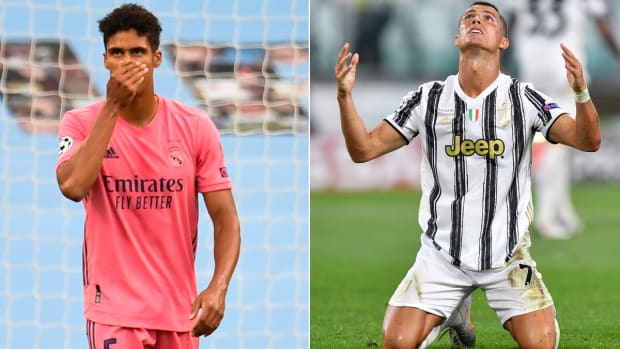Manchester City and Lyon have earned their places in the quarterfinals in Portugal, but more striking is how feeble and poor the champions of Spain and Italy were in going out.
From a purely dramatic point of view, there is something fascinating about the mess Juventus has got itself into. In its desperation to win the Champions League, every decision it has taken has apparently made that success less likely. An away-goals defeat to Lyon in the round of 16 is a far greater embarrassment than last season’s defeat to Ajax in the quarterfinals. The team that finished seventh in Ligue 1 is the one that goes forward to this season's final eight in Portugal, where it will meet Manchester City, who completed the job against Real Madrid on Friday with relative ease.
Cristiano Ronaldo was signed in 2018 at an enormous expense as, supposedly, a guarantee of the goals and decisive contributions in key moments Juventus felt it had been missing. Last season, Juventus went out in the last eight. This season, after replacing the serial winner Max Allegri on the bench with Maurizio Sarri, it went out in the last 16. Perhaps if Sarri could have produced the fluidity he did at Napoli, that style might have made Juventus more likely champions, but it is just not possible with a more static Ronaldo in his side.
Juventus has been scratchy all season, its ninth successive league title more the result of the grotesque financial imbalances in Serie A rather than its own excellence. This was the reckoning that had been coming. Yet even after losing the first leg more than five months ago there was a strange sense that Juve didn’t believe it could go out. That said, Lyon took a 13th-minute lead as Memphis Depay delivered a Panenka penalty after Houssem Aouar had (just about) been fouled by Rodrigo Bentancur.
Juventus had the better of the game from then on, but its threat had been limited before it, too, was awarded a fortuitous penalty after the ball struck Depay’s arm. Ronaldo converted to kick start what he hoped was a second straight year in which Juve would go through after scoring three unanswered in the second leg.
On the hour mark, Ronaldo got a second, and it came from nowhere. There had been no sustained pressure. It was not the result of a great move. Rather, he just lashed a left-footed shot into the top corner from a position just outside the box.
It was a goal that seemed emblematic of modern football: the big team not playing particularly well but having players capable of wrenching a game its way. It could be argued that’s why Juventus spent so much on Ronaldo, for just that sort of goal at just that sort of moment.
Even so, it’s increasingly hard to maintain the argument that the cost to the flow of the team has been worth it.

In less dramatic fashion, Madrid suffered a similar fate, a 2-1 defeat to City completing a 4-2 aggregate exit. But what was striking was less the result than the manner of it, as Madrid committed a catalogue of mistakes as though, unused to being challenged domestically, it has lost the ability to cope when teams stand up to it. Even by its standards, City pressed hard and high early, but Madrid's discomfort was still unexpected, the sense of numb disbelief that was induced leading directly to Raheem Sterling’s goal as Gabriel Jesus dispossessed Raphael Varane inside his own box.
But City is also vulnerable defensively. It has struggled to settle on a left back all season, and in the absence of the suspended Benjamin Mendy it was Joao Cancelo who took the role. He was beaten far too easily by Rodrygo, and although his cross was precise, it was still a little baffling that Karim Benzema could get a head to it unchallenged by any of the three City players around him.
That presented City an intriguing dilemma, one that highlighted the limitations (and arguably the glory) of the Pep Guardiola philosophy. It caused Madrid major problems with its pressing–Phil Foden was close to scoring shortly before halftime after Thibaut Courtois misplaced a pass–but pressing is a risk. And with the away goals rule, City couldn’t afford to get drawn into a free-for-all. That’s where, perhaps, the capacity to close a game down could be valuable, but it is a way of approaching the game to which Guardiola is ideologically opposed.
But in the end, Madrid’s mistakes were too overwhelming. The thought was just beginning to form that City might pay for its failure to punish Madrid’s sloppiness in possession when Varane misjudged a punted clearance then didn’t get enough power on his backward header, allowing Jesus to score with a deft finish. Whether the chaos was the result of Sergio Ramos’s absence (his red card in the first leg ruled him out for the second) or the unfamiliarity with being pressured–or perhaps a bit of both–Madrid’s jitters were extraordinary for a team that effectively won La Liga on the back of its defensive record.
Man City and Lyon may have rightfully earned their way through, but the deeper impression was just how poor the champions of Italy and Spain looked in going out.